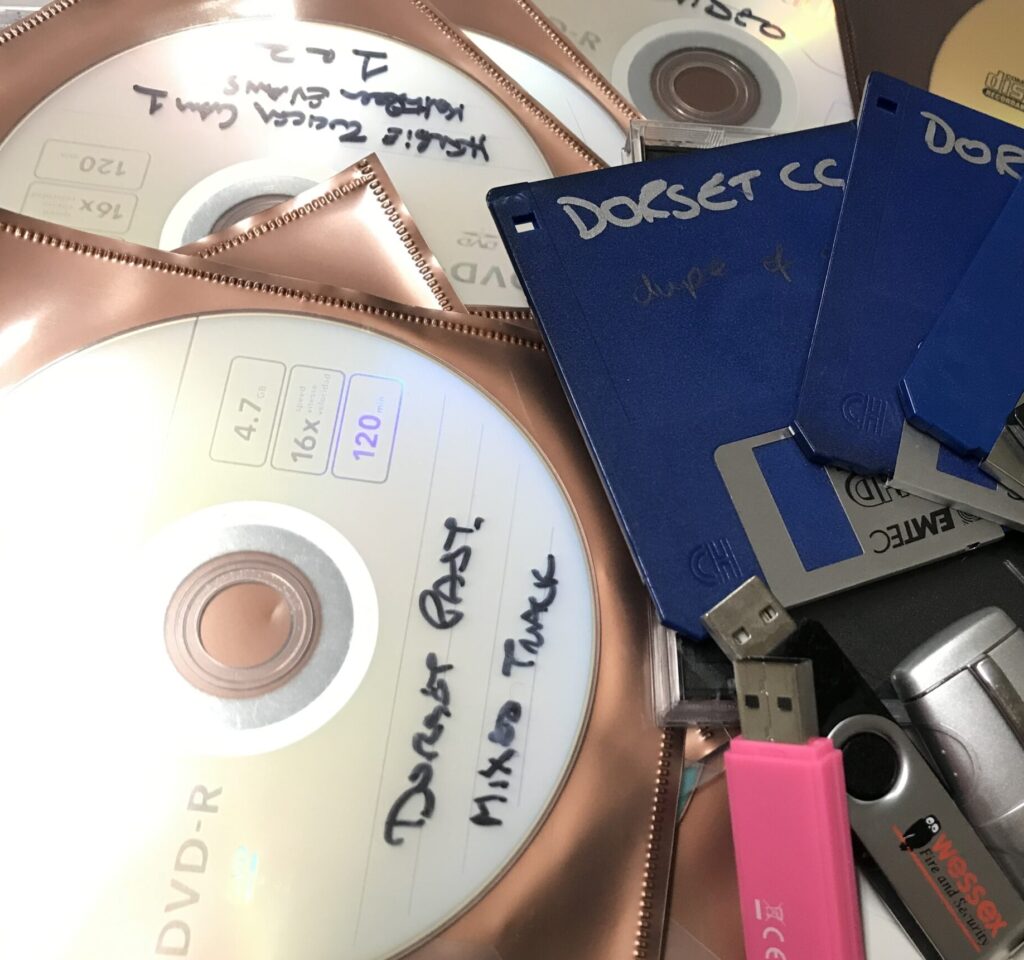We have records in our archive from 1900s, 1800s, 1700s and even as far back as 965 AD, over 1000 years old. These records are stored in our strong room and will be safely preserved there for many years to come. Interestingly, it is items which were created in the 21st Century which are at a much greater risk. Digital records are complex and more vulnerable to loss, corruption, or obsolescence than paper.
At the Dorset History centre, our Digital Preservation team are working hard ingesting records which are stored on digital objects such as floppy discs, hard drives and CDs to our digital repository. Digital objects which were once state of the art have become more troublesome to preserve as technology changes so quickly. The digital format which is most at risk is not the oldest or most obscure, it’s the CD-R.

In 1988, Phillips and SONY developed the Compact Disc – Recordable (CD-R) as a digital optical disc storage format which allowed users to record their own media onto the discs. While CDs are deemed a low-risk item, the CD-R is the highest risk object in our digital collection which is why we’ve made them our top priority. Even if stored in ideal conditions, CD-Rs will degrade quickly and have a lifespan of just 10 years. Unlike regular compact discs, CD-R have an internal layer of dye used to write and store data. Over time the dye can degrade, causing data to become unreadable. Stickers and permanent pens are often used to label the contents of CD-R which can cause additional problems. If stickers are too heavy or applied off centre this can cause excess vibration of the disc and the solvents from permanent pens can affect the dye layer.
While we take care of our digital collections, here are a few handy tips and tricks to help you care for your own personal collection at home. These tips will work for a lot of formats you may have in your own personal archive including vinyl records, CDs, DVDs and cassette tapes. If stored correctly, we can expect our collections to last for many years to come!
- Try to store your collection in a cool, dry place and always away from direct sunlight. Sunlight can fade the artwork cover and can do even more damage to the disc. Extreme changes in temperature or humidity can cause warping and damage.
- CDs, DVD’s, vinyl records and cassette tapes all benefit from being stored vertically. By stacking items horizontally, pressure is put on the discs which can cause them to become squashed and damaged.
- Handle your collection with care. Always hold your discs by the outer edge and don’t touch the surface of the disc. Try to return your disc to the case after use and stick to one disc per case if you can.
If you do have any precious family memories stored on CD-Rs, perhaps now is a good time to start transferring these to a hard drive or cloud storage to avoid loss in the future. And do talk to us! If you think that you have any digital records that would be of interest to us, or would like further advice, please contact our Digital Archivist and we would be happy to help: archives@dorsetcouncil.gov.uk


Posted on behalf of Roger Ellis:
“This is an extremely useful blog. I have been discussing this matter with a cousin over several years but we never reached a conclusion. This will help us. Seemingly not covered, although shown in your photograph, are memory sticks. I make considerable use of these as they are so convenient and easy to use. That applies to floppies too, although their use is very limited. Should I beware? Meanwhile I know someone who makes a paper copy of everything. She didn’t say if she has a good fire extinguisher!”
Hello Roger, thanks for getting in touch! Memory sticks are great devices as they are portable, sturdy and can store large amounts of data however they are not immune to data loss. If using memory pens or floppy discs to store important family photos and videos, we would recommend you make duplicate copies and store them somewhere else as a back-up of your important information. Much like CD-Rs, keeping your memory stick stored in a cool, dry location away from extreme temperatures and humidity changes will help prolong the life of your drive. Ejecting the pen before disconnecting from a computer and not having it plugged in for extended periods of time will also help your device last longer. Here’s a link to an article you might be interested in with some more helpful guidance: Cyber Trees and Virtual Woods: Looking after your digital records